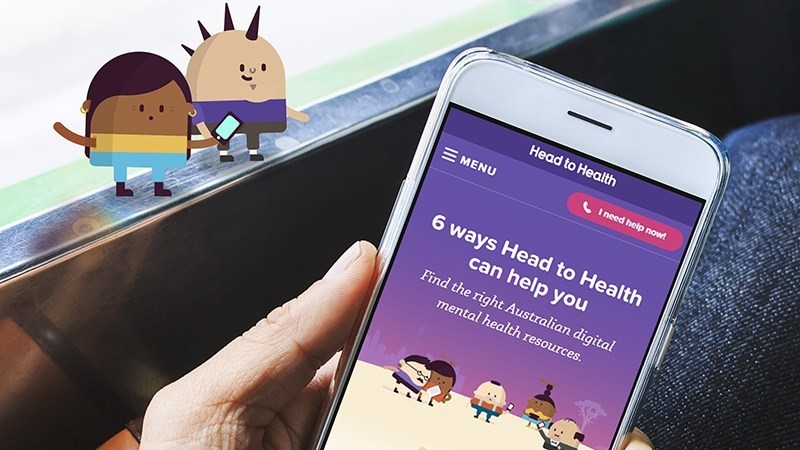Treating social anxiety
- People with social anxiety fear any social or performance situations in which they may be scrutinised or negatively evaluated by other people.
- An estimated 11% of transitioned veterans experience some form of social phobia within a given year.
- CBT is the psychological treatment of choice for social anxiety.
Key characteristics
Fears of being embarrassed in social situations or of public speaking are widespread in the community. With social anxiety, the fear interferes significantly with the person’s:
- normal routine
- social activities or
- occupational functioning
Social anxiety has two sub types:
- performance only involves fear of performing in public or in front of an audience
- generalised involves fear of most social and performance situations
Veterans may go out of their way to avoid the feared situation, or suffer intense fear and anxiety when exposed to it. Situations that are commonly feared by people with social anxiety include:
- speaking in public
- speaking to strangers or
- meeting new people
People with social anxiety may also fear eating or drinking in public, using public toilets or writing in public (e.g. filling in a form).
Social anxiety is relatively common, yet it is often undiagnosed as veterans may be reluctant to talk about their fears. In some cases, being in the clinical setting may itself stimulate anxiety symptoms and a veteran’s fear of being scrutinised, humiliated or embarrassed.
A missed diagnosis can also occur if the practitioner confuses:
- symptoms with shyness
- mistakenly judges secondary comorbid conditions, such as substance abuse and depression, to be the primary disorder
To ensure that a diagnosis of social anxiety is not overlooked, practitioners should consider the disorder whenever a veteran refers to feeling anxious in social situations.
Prevalence
Social Anxiety is common in civilian and veteran populations. The prevalence rates differ across cohorts and studies:
- Approximately one in twelve Australians will experience social anxiety at some point in their lives (McEvoy et al., 2011).
- Just under 5% of Australians experience social anxiety disorder within a given year (Andrews et al., 2018).
- An estimated 11% of transitioned veterans experienced some form of social phobia within a given year (DVA, 2018).
Screening and assessment of social anxiety
The following questions are recommended for the screening of panic disorder, social anxiety disorder and generalised anxiety disorder (Andrews et al., 2018):
- Do you worry about looking anxious or being embarrassed in social situations?
- Do you worry a lot about what people think of you?
Veterans who respond ‘yes’ to either question should be assessed further for symptoms of social anxiety. Practitioners may need to ask specifically about fear of a range of social and performance situations, as the person with social phobia is unlikely to spontaneously report the full range of their social fears.
- The Liebowitz Social Anxiety Scale (LSAS) can be used to measure social fear and avoidant behaviour, giving an indication of the degree to which social anxiety impacts normal functioning – however, it cannot be used as a diagnostic instrument in place of clinical assessment.
- Fear Questionnaire (FQ) is a useful tool for identifying situations that trigger anxiety.
- Depression, Anxiety and Stress Scale (DASS-21) is a general measure that can help track stress and anxiety as well as counselling outcomes.
None of the above tools are a diagnostic measure for social anxiety.
The practitioner should be careful to exclude the possibility that avoidance of social situations is associated with PTSD or agoraphobia. SAD and agoraphobia can be differentiated by determining what the principal underlying fear is – generally:
- agoraphobia is characterised by a fear of mental or physical harm
- SAD is characterised by fear of negative evaluation of embarrassment
Psychological interventions
Psychological interventions for social anxiety include:
Cognitive behavioural therapy
CBT is the psychological treatment of choice for social anxiety. Talking to a veteran, together with the veteran's family about his or her social anxiety is the start of treatment.
Whilst CBT has some general techniques applicable across a range of disorders, specific CBT techniques for targeting social anxiety are:
- Cognitive therapy – this involves addressing any unhelpful beliefs about the self and others which may have contributed to the development of social phobia and continue to contribute to its maintenance.
- Anxiety management – this includes relaxation activities, breathing retraining, and self-instruction training, and provides the veteran with skills to manage the anxiety arising from confronting feared social situations.
- Social skills training, if appropriate – this can include training in assertiveness and/or conversational skills.
- In vivo exposure – this is considered the cornerstone of social anxiety treatment. It involves graded in vivo exposure to feared social or performance situations. During exposure exercises, the veteran is discouraged from using safety behaviours (or unhelpful coping strategies), such as avoiding eye contact for fear of signs of disapproval or negative judgement.
Psychoeducation and self-management strategies
Psychoeducation is important as it helps to demystify the veteran’s symptoms, restore a sense of control and create hope for change. It is also important to encourage the veteran to do the following:
- Reduce substance use. This is a significant issue amongst individuals with social anxiety as using a substance (e.g. alcohol) prior to or during a social event is a common, but unhelpful, way of coping with the stressful situation. Indeed, almost 20 per cent of Australians with social anxiety have an alcohol use disorder. Early advice on reducing substance use is effective, and if benzodiazepines are used, they should be taken on a regular schedule as far as possible, rather than on an ‘as needed’ or ‘prn’ basis.
- Increasing avoidance of social situations is a significant feature of social anxiety, so encourage the veteran not to withdraw further from their routine, social supports and current roles (e.g. work, family).
Psychological treatment setting and duration
Social anxiety seen in clinical settings is often a severe and chronic disorder, requiring specialist treatment. Social anxiety can be treated in an outpatient setting. Treatment duration will vary between 8–12 sessions, although more sessions will likely be required for more severe or difficult cases. Treatment of social anxiety does not require hospitalisation, unless there is concurrent suicidal depression or substance use requiring detoxification.
Consideration should be given to the treatment of social anxiety on a group basis when this opportunity is available. Because the condition involves a fear of social and performance situations, group membership itself can be an important part of treatment, providing exposure to a feared situation. However, the intervention should be targeted to the needs of the individual, and group therapy may be too confronting for some in the first instance.
Pharmacological interventions
- Mild social anxiety will generally respond well to psychological intervention, without the need for pharmacological interventions
- For moderate cases, CBT, medication, or a combination of the two are recommended.
- For severe cases, initial treatment should involve concurrent interventions using both CBT and medication.
Newer generation antidepressants such as selective serotonin reuptake inhibitors (SSRIs) and serotonin-noradrenaline reuptake inhibitors (SNRIs) are the recommended first line pharmacological treatment; veterans who fail to respond to either of these may benefit from monoamine oxidase inhibitors (MAOIs).
As with all anxiety disorders, benzodiazepines are not recommended for the treatment of social anxiety due to the potential for tolerance and dependency. If benzodiazepines are considered necessary to bring about control of acute anxiety symptoms, the course of treatment should be kept as short as possible.
See also
-

Social anxiety
Social anxiety is a crippling fear of becoming the focus of attention, and worry about what other people are thinking about you. Self help and professional care can reduce the impact on your life. -
 Self-help resourcesHead to health
Self-help resourcesHead to healthHead to Health provides links to trusted Australian websites and apps to support the self-management of mental health symptoms, such as anxiety. visit Head to health
-
 Group programUnderstanding Anxiety
Group programUnderstanding AnxietyA program that teaches you strategies and skills for managing anxiety.





